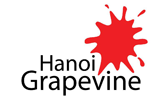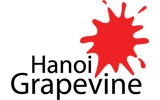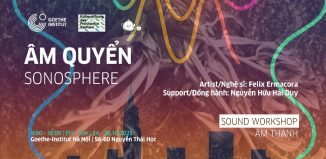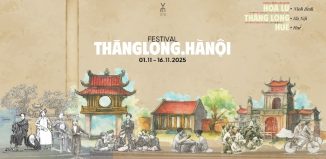Quỳnh Phạm – The Woman Who Tells Jazz
Interview by Uyên Ly for Hanoi Grapevine and Hanoi Blues Note
Supported by Minh Hiếu
Image provided by Hanoi Blues Note
Kindly credit Hanoi Grapevine when sharing the article.
Please do not copy or repost without permission.

Few people are aware that Quynh Pham was among the first jazz singers in Vietnam in the 2000s, in addition to being known among jazz fans for her poetic voice. The distinctive vocals by Quynh Pham must still be recognizable to audiences who regularly attended the Binh Minh Jazz Club on Luong Van Can Street in Hanoi at the time. The attractive, one-of-a-kind, and somewhat rioting twenty something woman lost herself in a number of timeless jazz tunes.
Her “signature” cover songs, Pho ngheo (Tran Tien), Hat theo nguoi di tren pho (by Anh Quan), and Gui nguoi em gai ( by Doan Chuan), are still well-known. Over the rainbow, somewhere Willow, please cry for me. Watermelon Man, Fly Me to the Moon, and Summertime are all iconic jazz tunes performed at the jazz club between 2004 and 2014.
For many years, Quynh Pham has not appeared as a singer. However, the singer in her has always been smoldering and just waiting for the time to blossom. Recently, when all the conditions were met, Quynh Pham prepared to release the first jazz EP in her singing career. She chose composer Trinh Cong Son, choosing to perform 05 songs of this musician in a jazzy style, a bit liberal and reflective, in a calm sphere coming from life experiences.
The”Roi nhu da ngay ngo” is the album’s title, which is also very significant and full of hidden meanings. It suggests acceptance, fortitude, and purity in day-to-day existence. People can push the button to play this album for themselves or with a few pals late at night or when they need to be a little more relaxed. In the golden-pink candlelight, Quynh Pham’s voice, a woman’s narration, reflects the artist’s life experiences and artistic themes while reflecting on and appreciating life and love against a minimalist and slightly nostalgic music backdrop.
Quynh Pham shared interesting revelations with us about her new product, as well as her time pursuing jazz in Vietnam.

When did you start pursuing jazz?
I started learning piano when I was 10 years old. My father is a singer, my mother is the daughter of two cai luong artists, and my sister is a music teacher. I grew up in an artistic family, so I learned music from a young age. At that time, I loved singing, but my father thought that singing was a difficult profession with many pitfalls, so he wanted his daughter to study piano.
I studied classical piano at the Military Arts Academy. In the 2000s, the school started to include pop music and jazz in the curriculum. It was one of the first jazz courses in Vietnam, so everything was new to us. Being used to the exemplary style of classical music, many people at that time had difficulty adapting to jazz played in a free, discordant style, including me.
Jazz is picky about its listeners. At that time, the country had just entered the “open-door period”, people were used to listening to popular music like pop or rock, not jazz. The difficulty in making a living with jazz motivated me to continue studying for a second degree in Business Administration at NEU (National Economics University), then worked for media and military companies in the field of editing & content production (Vietnamnet, Vietnamnet Media Group, VTC, …), and then started my own business.
I was a singer at musician Quyen Van Minh’s jazz club for about 10 years (2004-2014). Working in an office and singing, plus family matters, I did not dare to devote all my time to music. However, I still wanted to find a way to develop jazz music in Vietnam.
Around 2019, 2020, I decided to establish Hanoi Blues Note. Starting as a performance and event company, later following the changes of the market, I decided to expand into production, exploring and developing digital music on social networking platforms.
This process gave me the opportunity to look back at my career. Music is still what I love the most and do best, but for a long time I have ignored it. After a while, I feel that now is the time to do what I want with jazz.
You are good at other things as well, why do you think that you are doing music is your best?
Because I was raised and educated with music, exposed to music and fell in love with music since I was a child. Music is like my life, a lifelong passion. I feel lucky to be born and return to the right music profession.

During 10 years of singing at Quyen Van Minh’s jazz club, you both sang and did office work. How did you balance your life and work rhythm?
Those 10 years were the most productive time for me. During the day, I worked for 10 hours, then carried my gear to perform everywhere. At that time, I was not tied down by marriage, so I had freedom to be with music. I was very active, participating in many big and small jazz programs. Until I got married, I had to balance time between family and work, I almost quit and only accepted a few suitable programs.
Artists’ lives are like that, just one or two years of inactivity will definitely make people forget them. Everyone has to pay the price for what they want. If you want your family to be stable, you can’t devote all your time to work. Almost every artist has that problem, you have to be someone who loves and understands them very much to be able to be by their side.
I used to really want to release a music album, but I stopped halfway because the cost was too high, I didn’t have enough confidence, and I didn’t have anyone to support and guide me. When Hanoi Blues Note opened, I wanted to help artists by organíing free concerts to introduce new faces. I wanted to help and bring value to the community.

Please share a little about your album this time!
Since I started studying music, I have always cherished the dream of releasing my own products. But jazz is not a fertile land. Unlike other trendy music genres, jazz artists find it difficult to release their own products, or if they do, they are mainly products of instrumentalists, not singers. No young artist has a product that is produced and communicated properly.
That is why I want to release an album to inspire and motivate the young jazz generation. Many of you are talented and love jazz like me, but you do not have the experience and finances to release your own products.
This is the first EP with the jazz mark of a jazz singer singing Vietnamese music. At first, I planned to release the album in English, but then I thought that it had to be a purely Vietnamese product to convey the true state of jazz to listeners.
After thinking about it, I found Trinh’s music to be the most suitable. Trinh’s music has many poetic, beautiful, and humane qualities, similar to Bob Dylan (the legendary American singer and songwriter) of Vietnam. I like those lyrics. Trinh Cong Son’s lyrics and melodies are also suitable for jazz.
After the COVID period, the world has changed, people are more introspective, they care more about their true selves. I chose to sing in a narrative style, where I am the storyteller through jazz. I hope that this product is not only a milestone marking my personal journey but also a musical story closer to life.
What challenges did you face when performing Trinh Cong Son’s music in jazz?
Everyone is familiar with Khanh Ly’s soulful singing or Hong Nhung’s clear singing, so how to keep the spirit of the song but still put in your own style is difficult. I had to find the right song, try many different singing styles to find the most suitable version. During the two years of nurturing this project, I revised it many times, each time wanting to change.
The songs were recorded live. When listening, you may find some parts not smooth, but it is the most authentic sound, limiting the least editing according to the characteristics of jazz.
How did Quynh Pham’s team coordinate for this album?
The person who helped me the most was Thế Anh, the music director of the project. I gave him the job with the intention of seeing what young people think about Trinh Cong Son’s music, from there finding new perspectives. When arranging the songs, you also put your own story in, not just the story of the musician. How each song lives in the hearts of the public depends on how the musician tells that story.
Thế Anh is a young person with deep thinking. When he first started, he also felt stressed because he didn’t even listen to this genre of music much (laughs). I just suggested to him, Trinh’s music is beautiful, but beauty needs to suit the flow of the times, not just keep the old styles. Gradually, Thế Anh also found inspiration. He was interested and discussed with me which material was suitable, what material should be included in the final product.
We argued many times, but in the end, everyone completed exactly as I wanted: a woman telling stories of the new era, with a modern breath, and a fusion between the old and the new. I want myself to be like that in the future: an artist who renews little-known songs over the years, bringing in the color and spirit of jazz.

Different from the softness in this album, Quynh Pham has a very strong and edgy personality. Have you ever wanted to change to different colors of music?
Yes. I myself am a person with a personality and edgy in music. This first EP of mine is the color of a woman telling stories, but in future products it will be different. Maybe about Vietnamese classical traditional music, quan ho folk songs, ca tru,…
It’s not enough to talk about musical personality based on just one album. It’s just a color, a state on it.
What do you think Quynh Pham can contribute differently to this vast world of music?
Music is spiritual food, there are always people who like it and people who don’t like it. There are things that are suitable for the majority, there are things that are only suitable for a few people. As an artist, I have the responsibility to bring the audience an experience in the music story.
Each artist will have a different color. If it’s what you like, why not keep it? Why follow other people’s opinions? That’s the personality in music, not the rough appearance.
I hope that my modern, cozy way of speaking will reach people on the same frequency (experience, age). If any of my notes reach them, then that’s a success. Music doesn’t have to be academic or technical, making people think it’s something formidable.
Looking back on the past journey, what makes you feel most proud?
I’m proud to have built my own company, a music, performance and production company that is reputable with customers. What you do well will spread by itself. I want to bring values in music, inspire young people with a deeper direction and perspective. What I regret is that I wasn’t decisive with myself, but that’s in the past and now I have a clearer view.

In Vietnam, who influenced Quynh Pham in music?
Artist Quyen Van Minh, because that was the first professional jazz stage I performed on. I always respect those who dare to assert themselves very strongly. Now there are many talented friends, who cannot be compared in terms of professional techniques. But for those who have done a lot for music, I hope to be recognized for them. I want to separate the human aspect from the technical expertise.
About singers, I like Tran Thu Ha and Thanh Lam. Thanh Lam is like the eldest sister in the singing world, I like the way they treat their junior artists. When she finishes singing, she often waits for the band to finish playing before leaving, always respects her juniors, and always maintains the culture between colleagues. That is something that young people sometimes miss.
I like Tran Thu Ha for her singing style. She has her own color and personality, she is an example that makes me wonder why they can live their lives so fully in music like that. They are not related to the music genre I pursue, but I am impressed with them.
I also like Tung Duong, a person with a fierce personality in music, determined in pursuing the music he wants.
If this album were a painting, how would you describe the artist’s portrait with all the colors?
A red of fierceness. The black and white of the original.
Was there ever a time when something told you to make this album, if you didn’t do it, you would “die”?
Yes. I always think about when I can release a new product. If not now, then when? Although it is my first product and I have a lot of experience in the profession, I still encountered many difficulties and had to use all the support I had to complete this EP. But if you do nothing, you will always be an outsider to the profession.
Thank you very much Quynh Pham for taking the time to interview!













